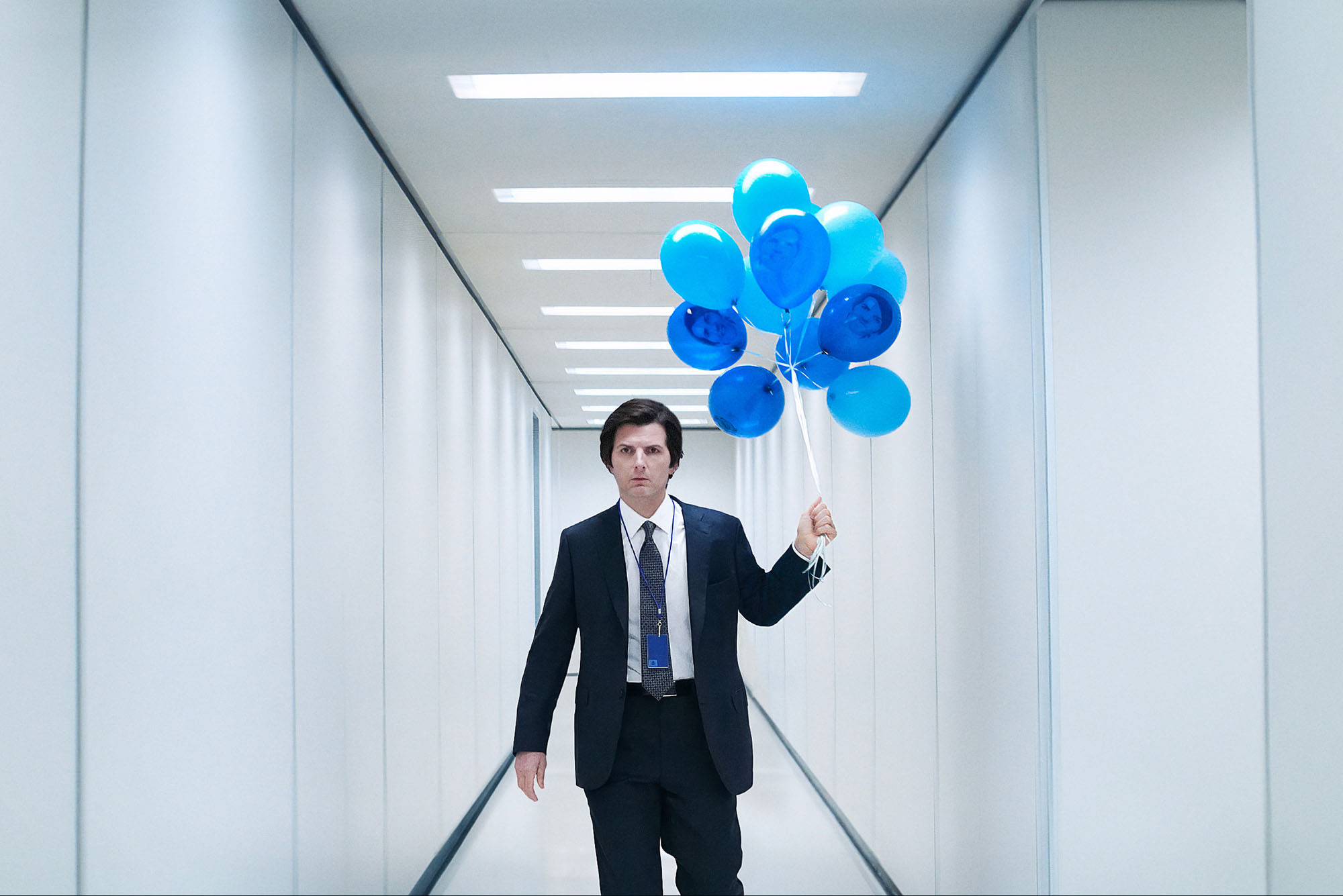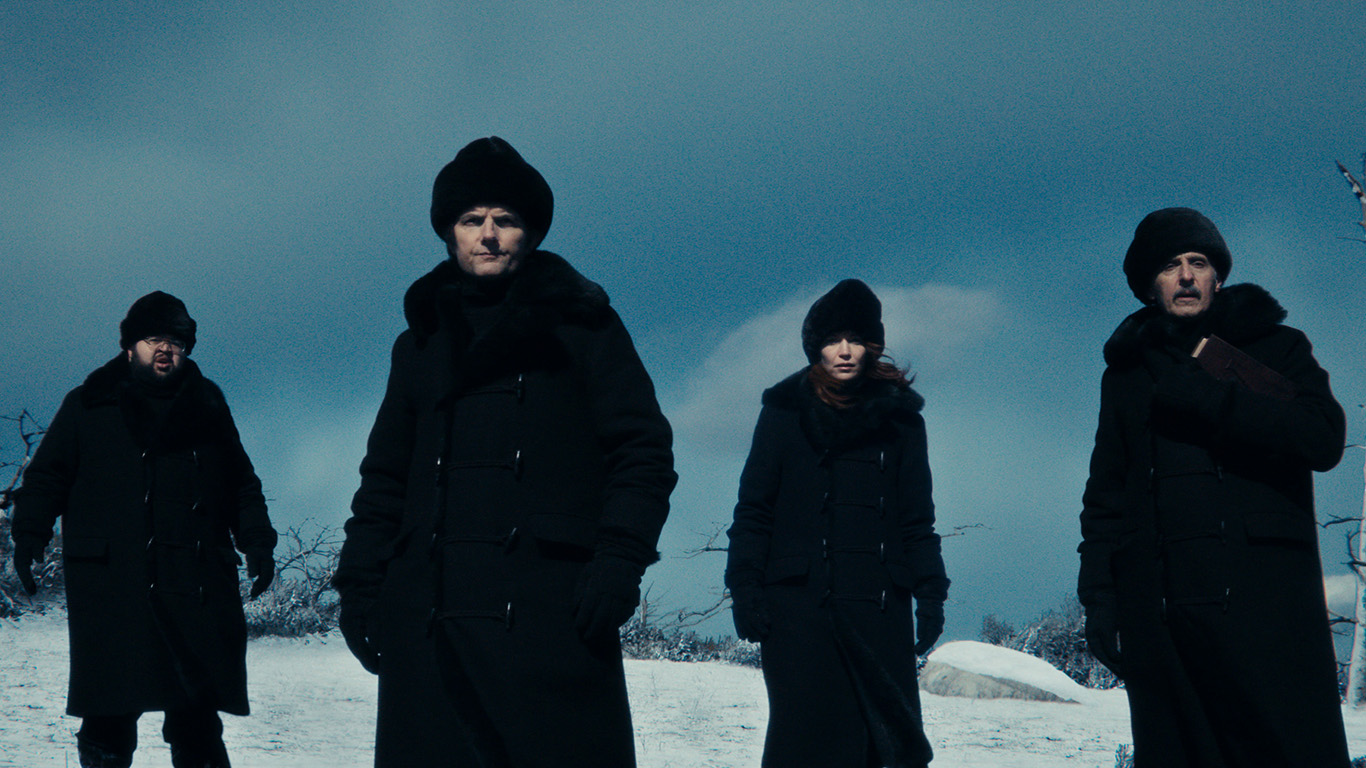Could Severance Ever Happen in Real Life?
In the wildly popular show, people undergo a procedure that “severs” their memories between work and home. Possible? BU neuroscientist Steve Ramirez’s answer

Mark Scout (played by Adam Scott) is among the characters in Severance that has undergone a surgical procedure that splits their memories between work and home. Could it happen in real life? BU neuroscientist Steve Ramirez says it may be possible. Photo courtesy of Apple TV+
Could Severance Ever Happen in Real Life?
In the wildly popular show, people undergo a procedure that “severs” their memories between work and home. Possible? BU neuroscientist Steve Ramirez’s answer
In the world of Severance, things are getting interesting. As the highly anticipated second season of the Apple TV+ show—which recently eclipsed Ted Lasso as the streamer’s most-watched program—careens toward a finale, its characters are grappling with heady ethical, logistical, and personal questions with no clear answers. But for viewers at home (no spoilers), perhaps one question rises above the rest: Is the show’s central premise actually possible?
A quick refresher: In Severance, some people undergo a surgical procedure called “severance,” which separates their work memories from their nonwork memories. At work, these “severed” characters have no access to their outside identities. They can tell if they’d had a bad night’s sleep, for example, only if they find themselves inexplicably yawning at work. The reverse is true as well. When they’re not at work, they have no idea what they got up to all day. The procedure—which viewers learn may also have applications outside of work—creates a scenario where characters have “innies” and “outies,” two versions of themselves that can have conflicting desires, motivations, and even worldviews.
“From a scholarship perspective, I really love what everyone else loves about the show, which is this idea that you could have two completely separate worlds of experiences with the same brain, and that you only have access to half of them, depending on—in this case—whether you’re outside of work or inside of work,” says Steve Ramirez, a Boston University College of Arts & Sciences associate professor of psychological and brain sciences. He is also a fan of the show.
For Ramirez (CAS’10), who studies memory storage and retrieval as well as ways to artificially modulate memories to help people with mental health disorders, Severance does another thing well, too. If we think about innies as our subconscious and outies as our conscious, then the show takes the concepts to their logical extreme.
“It does a really good job at connecting how the experiences of the world that either version of yourself goes through still affect each other,” he says. “So what you do in the outside world affects your inside world, and vice versa. The outie world and the innie world both affect each other.”

There are versions of this fictional innie/outie split that already happen in reality. Sleep is a good example. Ramirez says we can think about our wakeful selves as our outies and our dreaming selves as our innies. Dreams, as nonsensical as they may be, do tend to follow an internal logic that makes sense to our dreaming selves. And in the same way that the characters’ decisions outside of work affect their experiences inside work, what we do during the day certainly colors the dreams we have at night. It works the other way, too: a bad dream can set a strange tone for the rest of the day.
Or, consider regular, wakeful memories long lost to our immediate recall. “We all have memories that probably aren’t going to come back to us for years, if not decades, because they’re dormant somewhere in the brain, but presumably they’re still shaping our behavior and shaping our identities,” Ramirez says.
So, yes, less extreme versions of the severance procedure (severance-lite) do happen already in our regular, real lives, in the way that certain memories and experiences can be recalled or not. But Ramirez’s “hot take,” he says, is that since the procedure in the show doesn’t appear to break any of the laws of physics, it might just be possible, too.
“Let’s start by saying: I am a big fan of science fiction,” he says. “Hollywood has an infinite budget, relative to what we have in science, to experiment. That’s how we get Total Recall, Eternal Sunshine of the Spotless Mind, Inception, Severance, and so on. In Hollywood, they can really crank up their imagination and see what comes of it.”
Scientists, meanwhile, are bound by certain unassailable truths. “Anything that breaks the laws of physics as we know them, like traveling back in time, for example, is a nonstarter,” Ramirez says. “At least in Severance, my opinion is that I don’t think the show breaks any of those laws at all. Actually, I think it’s just a clever way of stopping and starting your record of experience and that a version of a record of experience then later becomes inaccessible to the other version of a record of experience.”
Again, this already happens. We have almost no memory of anything before we’re about three years old, a phenomenon known as “infantile amnesia,” Ramirez says. “But I don’t think anyone would argue against the idea that the experiences you’ve had from zero to three are pretty formidable, and shape the brain and shape part of who you are today, and have had lasting influences on you as an organism—and yet we don’t have access to any of that.”
But scientists have done experiments in mice where they’ve successfully retrieved memories once presumed to be lost to infantile amnesia. “That, to me, says there’s at least two versions of ourselves in existence within the same brain—one to which we have direct conscious access and one to which we do not,” he says.
“So for severance to happen in real life, you’re taking that idea, but rather than starting with infantile amnesia and going to adulthood, it’s just happening during two different parts of the day. Same idea, just different timing,” Ramirez says. “I was actually thinking the other day about how you might design an experiment to get this kind of state-dependent recall of entire experiences. I think, in theory, it should be possible.”
Until then, just take our word for it. Your outie is curious. Your outie is discerning. Your outie loves reading BU Today.

Comments & Discussion
Boston University moderates comments to facilitate an informed, substantive, civil conversation. Abusive, profane, self-promotional, misleading, incoherent or off-topic comments will be rejected. Moderators are staffed during regular business hours (EST) and can only accept comments written in English. Statistics or facts must include a citation or a link to the citation.